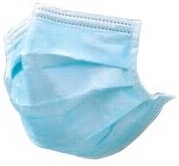Surgical Mask

A surgical mask, also referred to as a procedure mask, is designed for use
by healthcare professionals during surgical procedures and other times to
capture bacteria emitted in liquid droplets and aerosols from the wearer's
mouth and nose.
Beyond healthcare settings, similar-looking, inexpensive masks are commonly
worn in densely populated areas in East Asia to help prevent the spread of
the common cold. In Japan, it's customary to wear a face mask when ill to
prevent infecting others in public. Surgical masks saw widespread use in
China, Hong Kong, Vietnam, and Toronto, Canada during outbreaks of the SARS
virus, and more recently in Wuhan and surrounding cities during the 2020
Novel Coronavirus (Covid-19) outbreak.
They're also worn by individuals working in dusty environments such as
sanitation workers. Modern surgical masks are typically made from paper or
other non-woven materials and are disposable after each use.
Simple surgical masks offer wearers protection from being splashed in the
mouth with bodily fluids and prevent the transmission of such fluids from
medical professionals to patients. They serve as a reminder not to touch the
mouth or nose, potentially transferring viruses and bacteria from
contaminated surfaces (fomites). Additionally, they can reduce the spread of
infectious droplets containing bacteria or viruses emitted when the wearer
coughs or sneezes. However, they're not designed to protect wearers from
inhaling such particles. While they may trap some particles, they are less
effective than respirators, which are specifically designed for this
purpose.
Safety guidelines for healthcare workers recommend wearing a respirator mask
that has been face-fit tested and conforms to standards such as the United
States' NIOSH N95 or the European EN 149 FFP3 when dealing with pandemic-flu
patients. This helps reduce the wearer's exposure to potentially infectious
aerosols and airborne liquid droplets.
The CDC's N95 Factsheet provides further information on manufacturers'
products and emphasizes the importance of correctly fitting such masks
(respirators). This printable factsheet is intended for individuals
unaccustomed to using respirators.
undo Medical Equipment